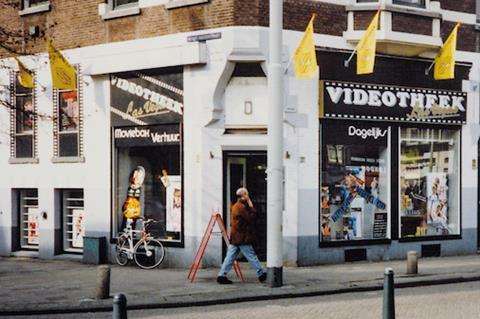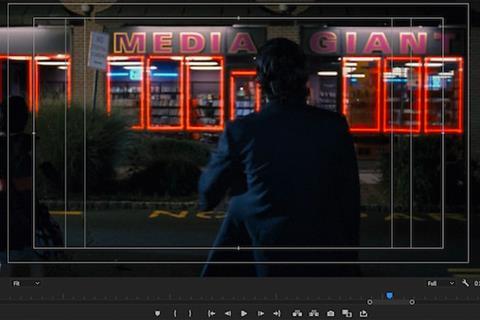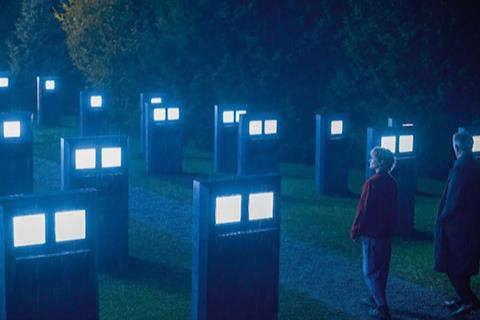
International Film Festival Rotterdam (IFFR) is allowing audiences to pause, rewind and travel back to an era when video shops were at the epicentre of film culture.
The IFFR special Focus programme ’Hold Video In Your Hands’ has premieres of two new documentaries about VHS culture: Alex Ross Perry’s Videoheaven, exploring the role of VHS in US film and TV, and Gyz La Rivière’s Videotheek Marco, a tribute to the once booming Dutch video scene.
The Focus also includes movies set in video stores (Be Kind Rewind); films about video dubbing and piracy (Video Kings); some horror (The Video Dead); a bit of gay porn (Raw! Uncut! Video!), some Croatian martial arts action (Bore Lee: Deadly Sins!), the latest David Cronenberg (The Shrouds) and even animation (Albert Birney’s Melody Electronics).
Programmer and curator Olaf Möller says the idea of a retrospective on VHS had been “gurgling” in the back of his mind for a while when he heard about Ross Perry and La Rivière’s documentaries. When he mentioned the idea to his IFFR colleagues, “everybody in the team went crazy about the subject….everybody has some kind of history with VHS. We all grew up in a period of VHS.”
Some of the programmers had even been video store clerks themselves.

Möller also regards Ross Perry’s Videoheaven as an instant classic, calling it “the most important work on cinema and social life since [Thom Andersen’s 2003 documentary] Los Angeles Plays Itself.”
“It’s the way that this film details 40 years of essentially American history, film by film, year by year, checking out the tiniest changes in video stores and the representation of video stores, and what this means in the relation to politics of the day.”
Sharing culture
Fifty years ago, it was widely predicted VHS would kill off movies. “VCR is to the American film producer and the American public as the Boston Strangler is to the woman home alone,” Jack Valenti, president of the Motion Picture Association of America, famously told US Congress. Despite his dire warnings, video proved a financial lifeline for the film industry. VHS stores, meanwhile, became social hubs and engines for rampant cinephilia. Even the smallest towns had one.
“VHS culture had an insane amount to do with sharing stuff,” Möller says. He discovered his “big love” of Japanese cinema through VHS. “And I remember the first real overdose of Iranian cinema I got was somewhere in the 80s in my home town when they did an Iranian festival by way of VHS. All the films looked like shit but, my god, did I get a first glimpse of true genius!”

His fellow programmers, many of them aged now in their 40s or 50s, were likewise given the chance to “see stuff [on video] that otherwise we would never ever have been able to, or at least not very easily.”
The Netherlands has its own rich and colourful VHS history, some of which is chronicled in La Rivière’s Videotheek Marco. The film, the Dutch director tells Screen, follows up on his 2021 book Home Video: Videotheken & Video in Groot-Rotterdam, and expresses his nostalgia for a time when watching movies at home was still a social activity.
“During Covid, we were inside the house, streaming a lot of films and series. [But] I really missed the video rental store because you have to go out to a store,” says the Dutch director.
He has carried out exhaustive research, tracking down photos, film footage and stories about the Netherlands’ many now vanished video stores.
“It’s a coincidence these films are coming out at the same time,” he says of his documentary and the one made by Alex Ross Perry. ”The funny thing is that I was in New York last spring and I went to Kim’s Video Store and I met him [Ross Perry]. He told me he was working on a film [about VHS stories]. I said ‘me too!’ And I gave him my book.”
Titles Möller has chosen for the IFRR Focus include Dawn Of A New Day: The Man Behind VHS, Sasabe Kiyoshi’s biographical movie about the JVC engineer who designed a home video systems for the masses.
Also screening is the little known German feature Tausend Augen (1984), a romantic fantasy about a young female student working in a peepshow that marked the directorial debut by the well-known West German film critic Hans-Christoph Blumenberg. Möller describes this as a masterpiece. It has cameos from Wim Wenders, George Miller and Philip Noyce - something which can only add to its cult appeal.
“I wanted to have views from all over the globe,” Möller says of the many different nationalities represented. “VHS had different meanings in different places. For me, it is really interesting to see what VHS did in India for example, how it shaped Hindi cinema in the 80s. For me, it was also interesting to dig into porn with Raw! Uncut! Video! which opens up another facet of the meaning of VHS.”
There is an accompanying “community programme” inviting the “Rotterdam audience to dig around on their video shelves” and bring in their own favourite old VHS tapes which the festival will then play. “People can basically fill in a form, tell us what they want to do and then we will try to fit it all in.”
At the time of his interview with Screen, Möller wasn’t sure of the location for the community programme. “I was always saying I wanted somewhere dark, somewhere cavernous, that feels like an early video store…”

























No comments yet